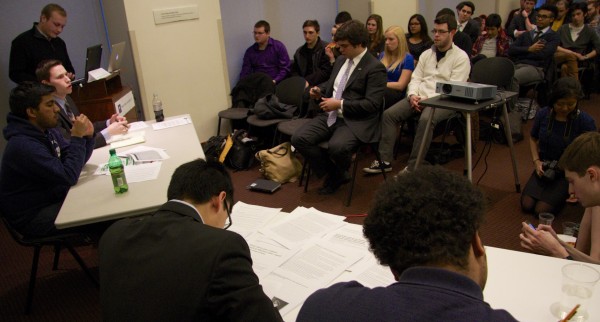
At the second semi-annual debate between the NYU College Democrats and the NYU College Republicans on March 27, club members argued about New York City Mayor Bill de Blasio’s proposed tax increases on the wealthy to fund prekindergarten education and national gun control.
As part of the first debate about New York City tax increases, Steinhardt freshman Jonathan Boyd and LS freshman Maggie Neal of the College Democrats faced off against Stern senior Louis Sleiman and Steinhardt freshman Ella Kuzmenko of the College Republicans.
The College Democrats emphasized that funding pre-K education, which would give students an extra year of schooling, would increase the chance of students staying in school longer and decrease the likelihood of their being involved in crime.
“The foundational value of a preschool education greatly increases the opportunity for future academic success by instituting enriched learning in a safe environment,” Boyd said. “According to studies conducted by the Society for Research and Child Development and the Foundation for Child Development, preschools provide necessary resources for instituting social skills and early educational ethics.”
The College Republicans said this policy is unfair toward those who earn more than $500,000 a year, also mentioning that this policy has already started to drive hedge funds away from an otherwise productive city market.
“My counterparts will argue that the tax is too minimal to have an effect, albeit 70 hedge funds having already left or lessened their exposure to New York City markets in fear of de Blasio’s neurotic case of subsidizing programs like prekindergarten,” Sleiman said.
The second half of the debate about gun control regulation was contested by CAS freshman Wenbo Wang and CAS sophomore Michael Peterson of the College Democrats, and CAS senior Ashok Deshmukh and CAS junior John Kurtz of the College Republicans.
The College Republicans contended that the liberal approach of banning all semiautomatic and automatic firearms is too extreme, stating that they were not accounting for the victimization of non-gun owners and the diversity in gun ownership.
“Using anecdotal evidence, my liberal colleagues took advantage of the situation to convince the American public that guns are dangerous to our safety, and fewer guns on our streets and in our cities would ultimately lead to less crime and less violence,” Kurtz said. “However, the facts show that that claim is just wildly untrue. Across the country, many cities that have imposed strict ban laws, such as New York City, have seen little to no decrease in their gun crime.”
The College Democrats countered by saying that there is no practical reason for such weapons to be in circulation.
“Even armed households who did so for self defense against robbery and theft fail more often than not,” Peterson said. “Five hundred thousand to one million times a year criminals choose to break into homes of families who aren’t home to look for guns that they then can use for themselves.”
After all arguments were made, Stern junior James Wu said he felt the debate helped him understand the issues at hand.
“The event exceeded my expectations because it brought two points of view supplemented by good arguments and informative data to inform us on the current issues,” Wu said.
Anjana Sreedhar is a staff writer. Email her at [email protected].























































































































































